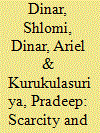|
|
|
Sort Order |
|
|
|
Items / Page
|
|
|
|
|
|
|
| Srl | Item |
| 1 |
ID:
081962


|
|
|
|
|
| Publication |
New Jersey, World Scientific Publishers, 2007.
|
| Description |
vii, 458p.Hbk
|
| Series |
World scientific series on energy and resource economics; vol. 3
|
| Standard Number |
9789812568939
|
|
|
|
|
|
|
|
|
|
|
|
Copies: C:1/I:0,R:0,Q:0
Circulation
| Accession# | Call# | Current Location | Status | Policy | Location |
| 053594 | 627.1/DIN 053594 | Main | On Shelf | General | |
|
|
|
|
| 2 |
ID:
088929


|
|
|
|
|
| Publication |
2009.
|
| Summary/Abstract |
The La Plata River Basin in South America, whose waters are shared by Argentina, Bolivia, Brazil, Paraguay and Uruguay, provides important lessons from the long history of negotiations over its shared water and other natural resources. In particular, innovative resource management practices developed over time have led to the relative harmony in which the riparian countries coexist. In this article, we analyze negotiation techniques within the La Plata River Basin by examining in detail the processes leading to the two seminal agreements - the 1969 Treaty of La Plata Basin and the 1979 Itaipú-Corpus Agreement. Based upon our analysis of the complex and often contradictory relationships between the riparian states, we evaluate the outcomes of both treaties from the standpoint of cooperation in the region and sustainable development. In doing so, we extend the relevance of the analysis to other basins with similar issues of regional management. The article extends the basin cooperation, through negotiation, to include trade agreements and development via project partnerships that draw in regional and global actors, including non-governmental organizations, environmental lobbies in foreign countries, and multinational development banks. The above actors are relevant for many parts of the world in today's era of globalization.
|
|
|
|
|
|
|
|
|
|
|
|
|
|
|
|
| 3 |
ID:
089812


|
|
|
|
|
| Publication |
London, Earthscan Dunstan House, 2009.
|
| Description |
xix, 339p.
|
| Standard Number |
9780844076697
|
|
|
|
|
|
|
|
|
|
|
|
Copies: C:1/I:0,R:0,Q:0
Circulation
| Accession# | Call# | Current Location | Status | Policy | Location |
| 054320 | 333.91/DIN 054320 | Main | On Shelf | General | |
|
|
|
|
| 4 |
ID:
106935


|
|
|
|
|
| Publication |
2011.
|
| Summary/Abstract |
Water scarcity is popularly associated with inter-state conflict, yet the academic literature also touts scarcity as an important variable for understanding cooperation over international freshwater. Building on studies that consider the relationship between scarcity and hydro-political cooperation, this paper empirically investigates why water treaties are negotiated for some rivers and between some riparians, and not others. Rather than considering a linear relationship between scarcity and cooperation, this study hypothesizes a curvilinear relationship expecting agreements to emerge in situations where scarcity is moderate rather than very low or high. Additional variables considered for understanding treaty formation include level of governance among the riparian states, prevailing power dynamics along the river, overall inter-riparian relations (measured by trade, diplomatic ties, and militarized disputes), and the geographical configuration of the entire river. The hypothesized curvilinear relationship between water scarcity and cooperation finds significant support in the empirical analyses. Governance, diplomatic relations, and trade are likewise found to be salient in explaining the levels of cooperation. The geographical configuration of the river was significant in only part of the estimates, and the militarized disputes variable was found to be insignificant across all models. Finally, while results confirm that cooperation may not depend on power asymmetries within riparian dyads, as suggested by some theories, the paper does find support for the contention that more developed states are in a position to provide incentives, such as financial transfers, to less-developed states so as to facilitate an international agreement.
|
|
|
|
|
|
|
|
|
|
|
|
|
|
|
|
|
|
|
|
|